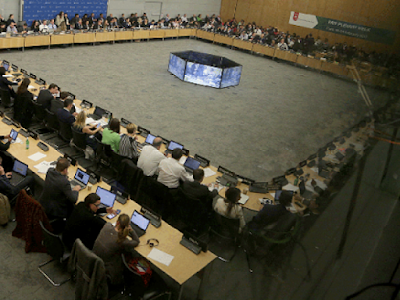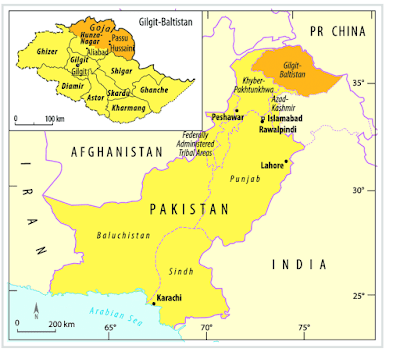Financial Action Task Force (FATF)
Introduction
Financial Action Task force (FATF)
is an intergovernmental organization established by G-7 summit ,held
in Paris in 1989.After terrorist attacks in United States on
December 11,2001 ,the organization added countering terrorism
financing to it's mandate.
It was founded to combat the
threats posed to the banking system and financial institutions. The G-7
Heads of state and President European Union convened the task force from G-7
members ,European Commission and eight other countries. The FATF decision
making body ; the FATF plenary meets three times a year.
Mandate of FATF
To set standards and promote
effective implementation of legal ,regulatory and optional measures for combating
- Money
Laundering
- Terrorist Financing
- Other threats posed to International Financial System
(IFS)
- Financing of proliferation of nuclear weapons for mass
destruction
Money Laundering and Terrorist
Financing
Both money laundering and terrorist
financing are financial terms. Subtly money laundering pertains to
distinguishing money earned from crime ,corruption, tax evasion ,drug
trafficking and fraud.
Terrorist Financing is the
collection of funds from legitimate sources and individuals but applied on
crimes like terrorist organizations.
What is FATF looking for in Anti
Money Laundering (AML) and Combating Terrorist Financing (CFT)?
FATF formulated a set of 40
recommendations which later have become international standards. The
recommendations over the period of time enhanced and are updated accordingly.
They were first issued in 1990 ,then in 2001,2003 and 2012 to ensure that they
remain up to date and relevant for universal application.
FATF Recommendations:
In a nutshell the FATF
recommendations are as under:
- Identify the risk ,develop policies and domestic
coordination.
- Pursue money laundering ,terrorist financing and
financing of nuclear proliferation.
- Apply preventive measures for financial sector and
other designated sectors.
- Establish powers and responsibilities for the competent
authorities i.e law enforcement, investigatory and supervisory authorities.
- Enhance transparency and availability of beneficial
ownership, information of legal persons and arrangements and facilitate international corporation.
FATF Assessment Methodology
- Technical compliance about legal and institutional framework ,power and procedures of competent authorities.
- Effective assessment to the extent to which legal and
institutional framework is producing expected results.
FATF and Pakistan
FATF has put Pakistan on a list of
"Jurisdiction and strategic deficiencies" also known as the Grey
List. It is not the first time Pakistan has been put in grey list
but it was there in 2008 ,and from 2012 till 2015 when it completed an IMF
program and also raised funds from international bond markets. Other countries
in grey list includes Ethiopia ,Serbia, Srilanka, Tunisia and Yemen.
Pakistan has been the most
significant in the list due to comparatively big population ,economy and large
army. It has been placed in grey list because of structural deficiencies in
Anti-Money Laundering (AML)and combating Financing of Terrorism (CFT).
Entry and exit from grey list is on
and off exercise for Pakistan. The countries like Panama ,Kenya and Nigeria
remained successful to get exit from grey list if history is unveiled.
Is Pakistan really the worst
Performer ?
Basel Anti money Laundering Index is
a watchdog with 14 indicators to check for regulation, corruption and financial
standards. It kept Pakistan at 46 place out of 146 countries in total. Pakistan
remained way better then Kenya ,Panama and Tajikistan. All the three are not
present in Grey List of FATF.
Global Terrorism Index 2017 by
Institute of Economics and Peace ranks Pakistan 5th most affected country due
to terrorism after Syria ,Iraq, Afghanistan and Nigeria. Besides this Pakistan
is striving hard to pull itself out of the quagmire of terrorism. At some
fronts it improved far better.
Implications for Pakistan of being
placed on Grey List
If Pakistan stays in grey list for
longer period of time then banking system of Pakistan could be adversely
affected. It will defame Pakistan on international arena ,social and electronic
media. Foreign direct Investment will be at stake. Financial Institutions will
carry out enhanced checking and scrutiny. Imports and Exports will be badly
affected. Perhaps the biggest peril of being on grey list for Pakistan is, it
could be pushed to black list like Iran and North Korea.
Is this financial or Political
Issue?
Ostensibly the placement
of Pakistan in grey list is a political issue in nature because US being the
major financier of FATF wants Pakistan to "do more" against terrorism
specially terrorist financing. The biggest name US and India always claim to
have shelter from Pakistan is Hafiz Saeed but Pakistan proved it baseless as
the story was picked up by BBC News.
BBC news reported in 13 February
,2020 An anti-terrorism court in Pakistan has sentenced hard line
Islamist cleric Hafiz Mohammad Saeed to 11 years in jail for financing
terrorist operations.
The man accused of masterminding the
2008 Mumbai terror attacks that killed 161 people is to serve two
five-and-a-half prison terms concurrently.
Saeed has been wanted by India for
years, and is designated as a global terrorist by both the UN and the US, which
has a $10m bounty on his head. He's the founder of one of Pakistan's largest
militant groups, Lashkar-e-Taiba (LeT).
Significantly,
Saeed's conviction comes a week before the Paris-based FATF discusses
Pakistan's progress in curbing terror financing.
Pakistan still at risk of being
placed on Black list
Out of 27 points action plan given
by FATF, it had declared Pakistan fully compliant on 14 points. Pakistan will
have to comply with remaining crucial 13 points till June 2020, including
prosecution and conviction of banned outfits and proscribed persons, for which
the list already provided to Islamabad in order to come out of grey list of
Financial Action Task Force (FATF)
The 13 points of 27 action plan
Pakistan needs to work on are as under :
- Pakistan will have to demonstrate effectiveness of sanctions including remedial actions to curb terrorist financing in the country.
- Pakistan will have to ensure improved effectiveness for terror financing of financial institutions with particular to banned outfits.
- Pakistan will have to take actions against illegal Money or Value Transfer Services (MVTS) such as Hundi-Hawala
- Pakistan will have to place sanction regime against cash couriers.
- Pakistan will have to ensure logical conclusion from ongoing terror financing investigation of law enforcing agencies (LEAs) against banned outfits and proscribed persons.
- Pakistani authorities will have to ensure international cooperation based investigations and convictions against banned organizations (list provided to Pakistan) and proscribed persons (list provided to Pakistan).
- The country will have to place effective domestic cooperation between Financial Monitoring Unit (FMU) and LEAs in investigation of terror financing.
- Prosecution of banned outfits and proscribed persons (list provided to Pakistan).
- Demonstrate convictions from court of law of banned outfits and proscribed persons (list provided to Pakistan).
- Seizure of properties of banned outfits and proscribed persons (list provided to Pakistan);
- Conversion of madrassas to schools and health units into official formations (list provided to Pakistan).
- To cut off funding of banned outfits and proscribed persons;
- Pakistan will have to place permanent mechanism for management of properties and assets owned by the banned outfits and proscribed persons (list provided to Pakistan).
Pakistan
has met most of the conditions set by the Financial Action Task Force (FATF) –
an intergovernmental organization that aims at making policies to combat money
laundering and terrorism financing, Minister for Interior Ijaz Shah told Prime
Minister Imran Khan in a meeting on June 11,2020.Lets hope to see Pakistan's
exit from grey list soon.




Comments
Post a Comment
Ask for further queries.